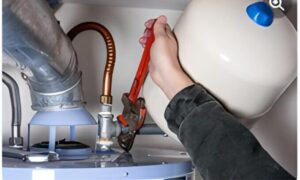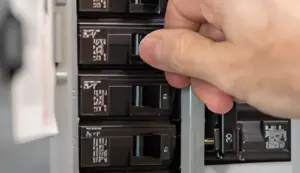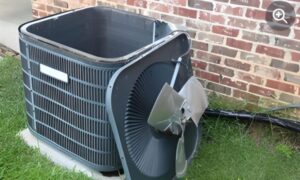In our busy lives, we often prioritize the cleanliness of our outdoor environment, forgetting that the air we breathe indoors can be just as important to our health.
With the potential risks associated with poor indoor air quality, it is crucial to take simple steps to ensure a cleaner and healthier living space.
From implementing effective filtration systems to maintaining proper ventilation, there are various measures we can take to breathe easy and create a safer indoor environment for ourselves and our loved ones.
In this article, we will explore these simple yet essential steps, revealing how small changes can have a big impact on our overall well-being.
Importance of Indoor Air Quality
Why is indoor air quality so crucial for maintaining a healthy and safe environment?
Indoor air quality plays a significant role in the overall well-being of occupants. It is essential because indoor air can be two to five times worse than outdoor air, and poor indoor air quality can be more harmful to health than outdoor air. Polluted outdoor air can easily enter indoor spaces, carrying with it a host of harmful pollutants.
Additionally, HVAC systems can circulate these pollutants throughout the space, further compromising the indoor air quality. Therefore, it is crucial to prioritize indoor air quality and take necessary measures to improve it.
This includes regular maintenance of HVAC filters, changing filters in vacuum cleaners and air purifiers, inspecting fireplace flues, ensuring proper ventilation in bathrooms, avoiding air fresheners, cleaning ducts, practicing green cleaning, and regularly maintaining HVAC equipment.
HVAC Filters
HVAC filters play a crucial role in improving indoor air quality by trapping pollutants such as pollen, dust, and smoke. Standard air conditioner and furnace filters are not effective in removing these contaminants. However, HEPA filters are designed to enhance air quality by efficiently capturing these particles.
When considering upgrading filters, it is advisable to consult an HVAC professional for guidance. It is important to regularly change filters every three months to ensure their effectiveness.
In addition to HVAC filters, it is also essential to regularly change filters in vacuum cleaners, air purifiers, and clothing dryers. Cleaning kitchen vent hood screens and HVAC registers and vents, as well as using exhaust fans when cooking, are recommended to prevent outdoor air pollution from entering.
Other Filters
Regularly changing filters in vacuum cleaners, air purifiers, and clothing dryers is essential for maintaining cleaner indoor air. These filters play a crucial role in trapping airborne particles, allergens, and pollutants, preventing them from recirculating into the air.
Vacuum cleaner filters, such as HEPA filters, effectively capture dust, pet dander, and other microscopic particles that can trigger allergies and respiratory issues.
Air purifiers use filters to remove contaminants like pollen, mold spores, and tobacco smoke, improving indoor air quality.
Similarly, clothing dryer filters capture lint and prevent it from being released into the air, reducing the risk of indoor air pollution.
Fireplace Flues
To ensure the safety and well-being of occupants, it is crucial to pay attention to the condition and maintenance of fireplace flues. Regularly inspecting flues is important as leaky flues can be a source of carbon monoxide, a poisonous gas. Professional inspection is recommended to ensure their safety. Properly functioning flues are also important in preventing occupants from being exposed to dangerous carbon monoxide. This is true for both homes and commercial establishments. Whether it's a residential fireplace or a fireplace in a commercial establishment, maintaining the flues is essential for the safety of everyone inside.
Bathroom Vents
Proper ventilation in bathrooms is crucial for maintaining a healthy indoor environment and preventing moisture buildup and mold growth. Bathroom vents play a vital role in ensuring adequate air circulation in this area.
When a bathroom is used, excess moisture is generated from activities such as showering or running hot water. Without proper ventilation, this moisture can accumulate, leading to the growth of mold and mildew. Bathroom vents effectively remove moisture and odors from the air by expelling them outside the building.
Avoid Air Fresheners
Air fresheners should be avoided due to the release of dangerous volatile organic compounds (VOCs) that can negatively impact indoor air quality. These chemicals can have detrimental effects on human health and contribute to respiratory problems, allergies, and even long-term illnesses.
To improve indoor air quality and eliminate odors without the use of air fresheners, consider the following alternatives:
- Address the cause: Instead of masking odors with harmful chemicals, identify and eliminate the source of the odor. This could involve cleaning surfaces, removing mold or mildew, or improving ventilation.
- Natural solutions: Opt for natural alternatives such as using hot water and dish soap to clean surfaces and eliminate odors. These solutions are effective and do not release harmful VOCs into the air.
- Indoor plants: Incorporate indoor plants that have air purifying properties, such as snake plants or peace lilies. These plants can help filter out pollutants and improve air quality naturally.
Duct Cleaning
Cleaning ducts is an essential maintenance task that improves indoor air quality and ensures the efficient operation of the HVAC system. Over time, debris such as dust, dirt, and allergens can accumulate in the ductwork, which can then circulate through the air and negatively impact air quality. By cleaning clogged ducts, these contaminants are removed, resulting in cleaner and healthier air for occupants.
Additionally, regular duct cleaning can enhance the performance of the air conditioner, preventing breakdowns and system malfunctions. This maintenance task is crucial for maintaining a clean and healthy indoor environment.
It is recommended to consult with an HVAC professional to determine the appropriate frequency for duct cleaning based on the specific needs of the space.
Green Cleaning
Regular maintenance tasks such as duct cleaning contribute to a clean and healthy indoor environment. Another important aspect of maintaining indoor air quality is adopting green cleaning practices. Green cleaning involves using environmentally friendly products and methods to clean and disinfect indoor spaces.
Here are three key benefits of green cleaning:
- Reduced Chemical Exposure:
- Green cleaning products are free from harsh chemicals and toxic substances.
- By avoiding chemicals that release volatile organic compounds (VOCs), indoor air quality is improved.
- This reduces the risk of respiratory problems, allergies, and other health issues associated with chemical exposure.
- Safer and Healthier Indoor Environment:
- Green cleaning promotes a safer and healthier indoor environment for occupants.
- Using natural alternatives such as hot water and dish soap can effectively clean surfaces without compromising air quality.
- It also eliminates the risk of accidental ingestion or skin irritation from chemical residues.
- Environmental Sustainability:
- Green cleaning practices contribute to a more sustainable environment.
- By using eco-friendly products, we reduce the release of harmful chemicals into the air and water systems.
- This helps protect the ecosystem and supports a greener future.
Frequently Asked Questions
How Often Should I Change the Filters in My Vacuum Cleaner, Air Purifier, and Clothing Dryer?
It is recommended to regularly change filters in vacuum cleaners, air purifiers, and clothing dryers every 3 months. This helps maintain optimal performance, improve air quality, and prevent the buildup of contaminants in indoor spaces.
Can Opening Windows Improve Indoor Air Quality?
Opening windows can improve indoor air quality by allowing fresh outdoor air to circulate and dilute indoor pollutants. However, it is important to consider outdoor air quality and potential allergens. Regular HVAC maintenance and using effective air filters are also crucial for maintaining clean indoor air.
How Can I Ensure the Safety of My Fireplace Flue?
To ensure the safety of your fireplace flue, regular inspection by a professional is recommended. Leaky flues can release carbon monoxide, posing a health risk. This is crucial for both residential and commercial establishments.
Is It Necessary to Wire the Bathroom Exhaust to the Light Switch for Automatic Operation?
Wiring the bathroom exhaust to the light switch for automatic operation is not necessary, but it is recommended. It ensures proper ventilation, prevents moisture buildup and mold growth, and contributes to a healthy indoor environment.
Are There Any Natural Alternatives to Air Fresheners That Can Improve Indoor Air Quality?
Yes, there are natural alternatives to air fresheners that can improve indoor air quality. Opt for solutions like hot water and dish soap to eliminate odors at the source, avoiding harmful chemicals and reducing VOC exposure.
Conclusion
In conclusion, ensuring clean and healthy indoor air is crucial for our well-being.
Implementing proper filtration systems, such as HEPA filters in HVAC systems and other appliances, can greatly improve air quality by trapping pollutants.
Regularly changing these filters, maintaining fireplace flues and bathroom vents, avoiding air fresheners that release harmful compounds, and practicing green cleaning methods are all simple steps that can contribute to a cleaner indoor environment.
By taking these measures, we can breathe easy and enjoy a healthier living space.







